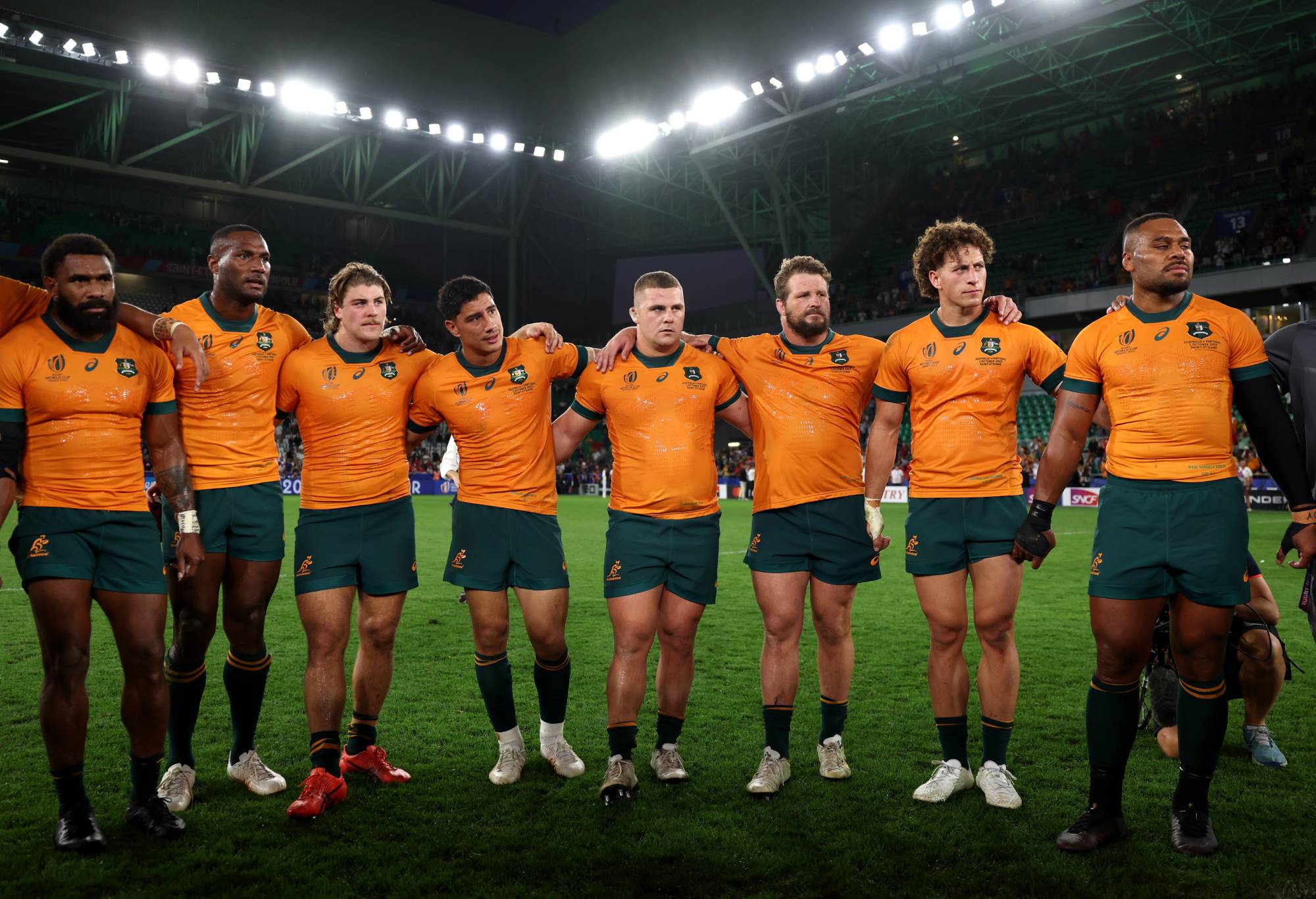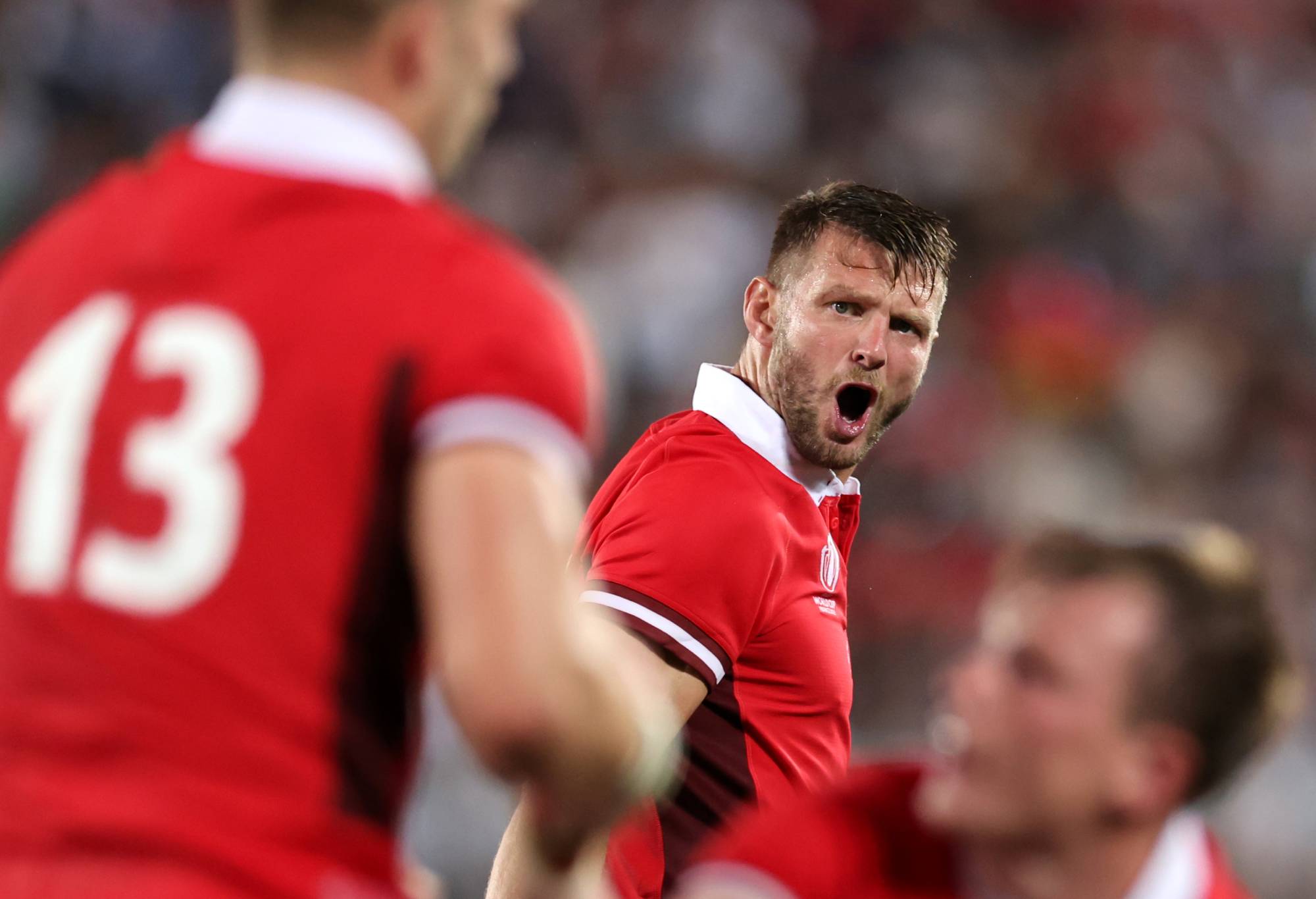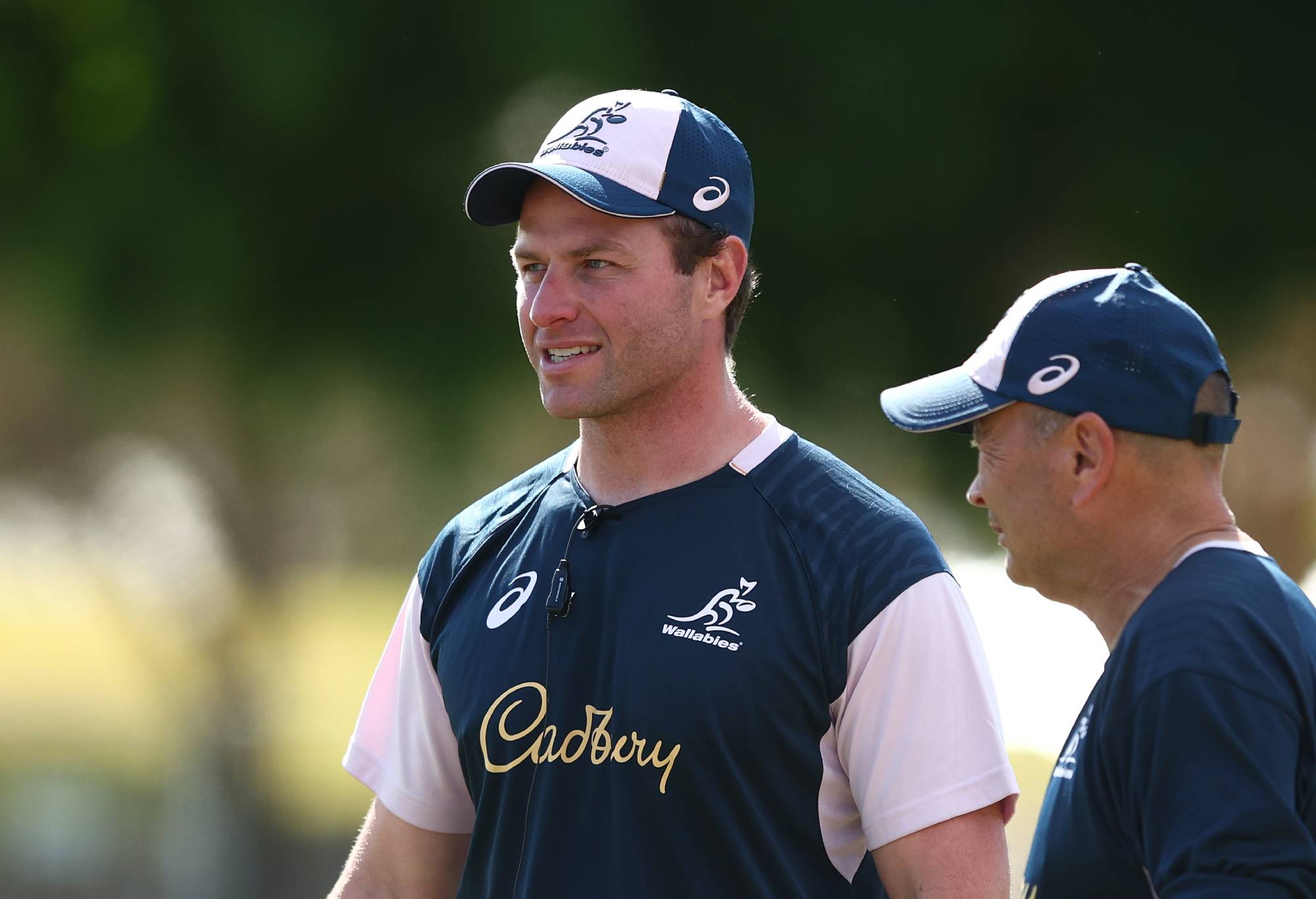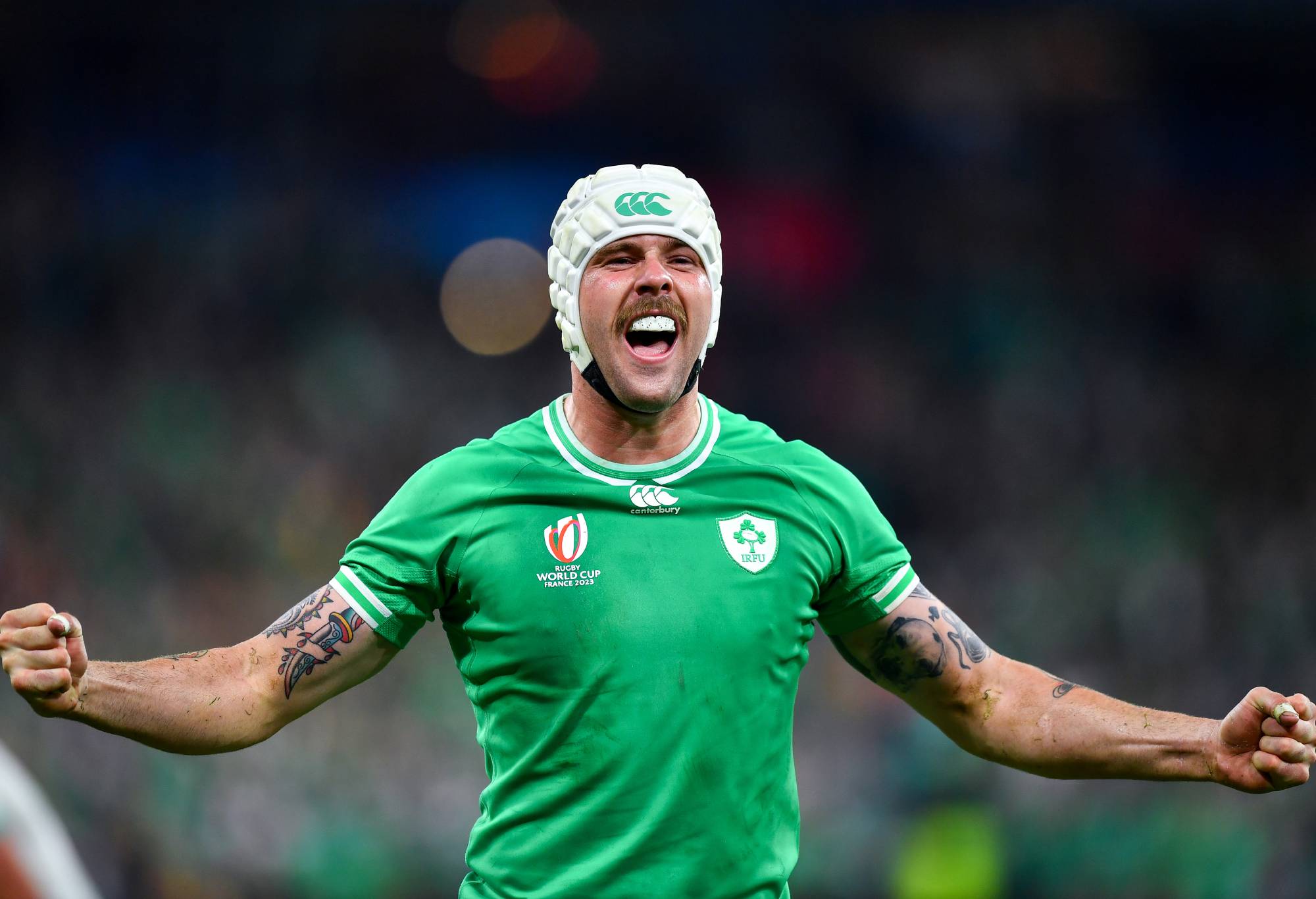The media department for the Wallabies put their best spin on the ‘Zombie Wallabies’ 34-14 bonus point victory over Portugal in their final pool match at the 2023 Rugby World Cup:
“[It] means the Wallabies now need Portugal to beat Fiji by 8 points or more in their final pool match next Monday morning (AEDT) in Toulouse to make it through to the knockout phase.”
I know that journalists are prophets of the past rather than being prophets of the future. But this outcome is just not going to happen.
The Wallabies played about as poorly as they have ever played in a RWC tournament and for eight minutes towards the end of the match had 13 players on the field and yet they were good enough, or perhaps better phrased, not bad enough to defeat a spirited Portugal side by scoring four tries, three penalties and one conversion to Portugals 2 converted tries.
It is true that what may happen can happen. But for Portugal to smash Fiji next weekend and not allow their opposition to gain a single bonus point would be like Lazarus rising from the dead with a quadruple by-pass.
Next Monday, the Wallabies squad and team of coaches are going to be flying out of France.
And the famed Wallabies, one of only four teams that have won the Webb Ellis trophy, are going join England as the only RWC-winning side not to make a quarter-final round in a RWC tournament.
At least England missed out reaching the RWC quarter-finals in 2015 in a Pool of Death that included Wales and Australia, with the Wallabies going on to be defeated by the All Blacks in the final at Twickenham.
How the mighty Wallabies have fallen to be hostage to Portugal to provide them a lifeline to the RWC 2023 finals.
Portugal playing in only their second RWC tournament, their first was in 2007, looked for much the match the better drilled in the scrums and lineouts and more dashing side in their ensemble play than the Wallabies.
The crucial part of the match came earlier on, with the Wallabies leading 3-0, when the Portugal centre Pedro Bettencourt scored a brilliant try in the corner which was converted from the sideline.
Bettencourt then incurred a yellow card for a high tackle on Izaia Perese.
Rob Valetini, the Wallabies best along with Angus Bell, inspired the Wallabies’ fight-back with an offload to Richie Arnold who plunged over near the posts.

SAINT-ETIENNE, FRANCE – OCTOBER 01: The players of Australia form a huddle at full-time following the Rugby World Cup France 2023 match between Australia and Portugal at Stade Geoffroy-Guichard on October 01, 2023 in Saint-Etienne, France. (Photo by Chris Hyde/Getty Images)
Valetini, again, won a turnover which set up a driving sequence allowing Dave Porecki to score from a rolling maul. Then Angus Bell barged over for his first Test try.
All the tries were converted and by the time Bettencourt came out of the sin bin the Wallabies had established a winning 24-7 lead.
Writing for The Guardian, Daniel Gallen noted that the ‘Zombie Wallabies’ will get little fanfare for their Portugal performance against such an inexperienced opposition:
“Portugal had two tries disallowed and coughed up numerous chances within striking distance. Their hooker, Mike Tadjer, twice spilled the ball with the try-line within reach. Australia won tonight. It’s a win that means their flights home can be delayed until Fiji secure the single point they need against Portugal next week. But this could, and perhaps should, have ended differently.”
This ‘Zombie Wallabies’ assessment is an astounding claim for an experienced rugby journalist to make.
In effect, Gallan, is making the case that Portugal deserved and should have defeated the mighty Wallabies.
Australia came out of this match as the 10th-ranked rugby nation. It is now a confirmed second-tier rugby nation.
Eddie Jones is arguing that he inherited a squad that could not win the 2023 RWC tournament. So he selected ‘the youngest Wallabies squad ever’ with the intention of developing this squad to win the 2027 RWC tournament.
“It genuinely takes five or six years,” he told journalists, “to build a World Cup-winning team.”
I am not buying this argument.
There is evidence even in this RWC tournament that coaches can take over teams whose coach has been sacked for poor results and get their new side into the finals. Once a team is in the finals it is game on for its RWC chances.
Wales and England, for example, had new coaches (like Australia) going into this RWC tournament after the collapse of their former coaching regimes. They are the only teams that have already won a place in the finals even though the fourth pool round has not yet been completed.
Warren Gatland was brought back as the coach of Wales after the 2022 Six Nations tournament to replace Wayne Pivac, whose side had won only three of their last 12 matches. Gatland coached his side to a 40-6 thrashing of the Wallabies in their pool round clash.
Steve Borthwick took over England at the end of last year after the team had won, under coach Eddie Jones, only one of its last four Tests.
After beating Argentina in the Pool D opening match of this RWC tournament, against most of the expert opinion, unbeaten England are looking to exploit their run of wins to make the semi-finals.

Welsh flyhalf Dan Biggar. (Photo by Jan Kruger/Getty Images)
What makes Eddie Jones so believable as a coach – until the rhetoric, the boasting and his record collapses?
Following his career from his Brumbies days, as the Wallabies coach from 2001 to 2005, then coach of Japan and later England, I believe there is a ‘Mad Scientist’ aspect that underpins his practice.
He knows thousands of things about rugby and coaching and loves to get new information by picking the brains of anyone and everyone to get it.
But for reasons that I do not understand from all this discussion he has embraced a theory of his own concoction about rugby playing that is obviously wrong and which, in turn, explains why his coaching career has been so chequered.
The Jones theory is that rugby is the same game as league, except that there are 15 players on the field rather than 13.
Therefore, his coaching practice adopts the very structured league systems on defence and attack that work in league.
Teams coached by Jones tend to play by numbers. There is very little playing with their eyes open to what is in front of them from his teams. They also tend to be weak in the set pieces, especially the scrums.
Jones’ record as a coach is marked by some sensational victories, especially Japan’s defeat of the Springboks in the 2015 RWC and England’s defeat of the All Blacks in the semi-final of the RWC 2019.
Jones is at his best when he plots and plans for a specific, targeted must-win match. Ultimately, though, his coaching stints have all ended with robotic teams losing sequences of matches by playing without panache or proper rugby systems.
David Campese noted, for instance, the joyless manner the Wallabies lined up during the anthems before the Wales match.
The problem with the Jones theory that rugby and league are the same game is that it is wrong. The two games are as different as tennis and squash.
There are two distinct differences between rugby and league that make them very different games, even though superficially they seem to have much in common.
Rugby is about a contest for possession while the ball is in play. League actually stops for every play-the-ball ruck because there is no contest for the ball.
There is no equivalent either in League for Rugby’s scrums and lineout.
This stop-start nature of League gives the attack and the defence time to re-group after every play. And this in turn creates the opportunity for shrewd coaches to create a play-by-numbers style on defence and attack that can create victories.
In rugby, on the other hand, the contest for the ball at every point of play, means that teams have to be able to adjust to situations that change by the second. This, in turn, means that mechanical teams will generally (except in the occasional famous occasion) be defeated by a well-coached side that can adjust their play in real-time to the changing events on the field.
And then there is the question of set-piece play.
In League, the set piece scrum or ruck is merely a way of starting play. In Rugby, the set piece scrum or ruck is actually a part of the play that involves numerous skills on the players to achieve possession and all the players to avoid giving away penalties in the battle contest.
When Jones took over from Dave Rennie as the coach of the Wallabies he allowed Laurie Fisher, a lineout guru, and Petrus du Plessis, a scrum expert, to leave his staff.
He appointed Dan Palmer, a scrum expert and a former Wallaby prop, as his lineout coach.
Astonishingly, he gave the crucial defence portfolio to Brett Hodgson, a former NRL player, who had never coached a rugby team in his life.

Lineout Coach Dan Palmer during the Australian Wallabies training session at Sanctuary Cove on June 29, 2023 in Gold Coast, Australia. (Photo by Chris Hyde/Getty Images)
As Paul Cully pointed out in a comment on what happens if Jones stays on as the Wallaby coach: ‘Can defence coach Brett Hodgson stay on his job after the Wallabies conceded 40 against Wales?’
And even more astonishingly, he gave the job of attack coach to Brad Davis, an Australian who played 200 games as a professional rugby league in England for a decade in the 1990s before moving into rugby coaching in 2006.
As The Roar pointed out when this appointment was announced, ‘Davis has built a strong reputation on the other side of the ball as a defence coach in Britain.’
Davis withdrew just days before the team left for the World Cup, only to be replaced by another league coach and former player, Jason Ryles.
Jones has also been very partial to selecting former rugby league players for the Wallabies, or encouraging Rugby Australia bosses to invest in rugby league talent to improve the Wallabies’ attack.
In RWC 2003, Jones dropped Matt Burke after the first game of the tournament, a 17-16 win against Ireland. The hero of the 1999 RWC triumph, Burke was replaced by rugby league ‘convert’ Mat Rogers as fullback.
For the final, Jones dropped Joe Roff, like Burke a great Wallaby player, for Wendell Sailor, another rugby league ‘convert’ brought into the Wallabies under the guidance of the rugby league-obsessed coach.
Both Sailor and Rogers played poorly in the cauldron of the World Cup final.
If Jones stays on as the coach of the Wallabies, it is clear that this obsession with rugby league players being lured into the Wallabies with vast sums of money is going to continue. This is despite the failure of a rugby league-led rugby revolution in the years Jones first coached the Wallabies between 2001 and 2005.
RA chairman Hamish McLennan, with the encouragement of Jones, has announced that he wants more players from the NRL following the disastrous campaign in RWC 2023.
Joseph Suaalii, a NRL prodigy in the Israel Folau mould but without Folau’s exceptional leaping skills, has already been signed up for 2025 British and Irish Lions series and 2027 RWC, both tournaments to be held in Australia.
The SMH reported a week or so ago that McLennan wants to seal the deal to sign up the Roosters star Angus Crichton for next season. The Roar reported that the figures quoted by the Herald were wildly inflated, and later that the deal had negotiations have collapsed.
The fact is that neither Suaalii nor Crichton would improve the Wallabies very much, and the money being lavished on league talent would be better spent at grassroots level.
Australian rugby is strong enough with outside backs that it allowed the Brumbies winger Mack Hansen to leave the club and go and play in Ireland at the end of the 2021 season.
The result of this stupidity? Ireland’s only try in its memorable win over the Springboks at this RWC was scored by Mack Hansen.

Ireland’s Mack Hansen celebrates victory over South Africa. (Photo by Franco Arland/Quality Sport Images/Getty Images)
There is a trajectory in the previous Eddie Jones campaigns as coach of Australia and England.
It all starts with a promising series of wins. Then over time, as the Jones obsession with playing by numbers and the neglect of the set piece system begins to destroy the team. What follows is a series of debacles and a sacking or forced resignation.
The Wallabies between 2001 and 2005 followed this pattern. Under Jones the Wallabies won the 2001 Tri-Nations Series. Then the Wallabies took England into the last minute of overtime in the RWC 2003 final before Jonny Wilkinson’s famous drop goal sank their hopes.
But by 2005 the Wallabies lost seven games straight. And at the end of their European tour they had lost eight of their last nine matches. The worst of these was against England, 26-16 at Twickenham.
A match report written by The Guardian’s Kevin Mitchell showed what happens when a Wallaby pack goes into a major Test with as much nous about scrumming as a rugby league pack:
‘The England forwards, led by all 19 stones of Andrew Sheridan in the front row, ground their lighter opponents from start to finish, and the pressure told when they were forced into continually collapsing the scrum on their own line … England, five stone heavier up front, were always going the bullying route, and there was little Australia could do about it.’
After a 22-24 loss to Wales at the Millennium Stadium at the end of the tour, Jones was terminated as the coach of the Wallabies by Rugby Australia.
This same pattern of winning first and then losing was exposed when Jones took up the role of coach of England.
Jones launched England on a spectacular start. His England won three Six Nations tournaments and reached a RWC final in 2019.
This start meant that by the time he was sacked Jones had established the best record of any English coach with 59 wins out 81 Tests, for a winning average of 73 per cent.
To put this record into perspective, Sir Clive Woodward’s winning record with England (which did include the 2003 RWC) was 71 per cent.
The final match in the Jones era as England’s coach was against the Springboks when once again a Jones-selected and coached pack was monstered by the Springboks.
In his last year as England’s coach, Jones won only five Tests out of 12.
In his latest edition as the coach of the Wallabies, Jones has started out losing most of his Tests rather than his usual winning start.
This suggests to me that The Wizard of Oz has been exposed as a coach with a method that was more smoke and mirrors than substance.
































































































